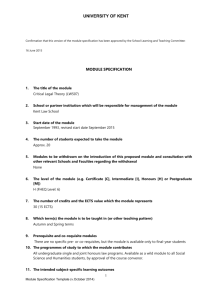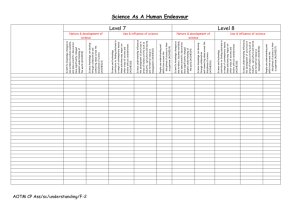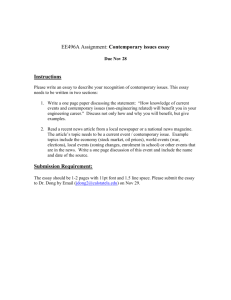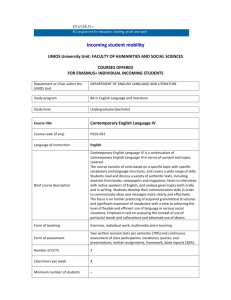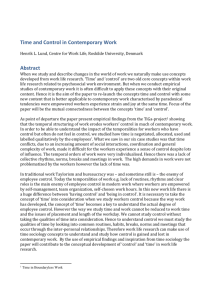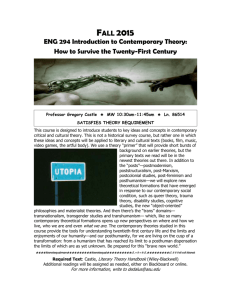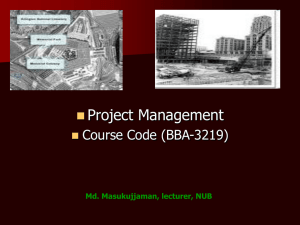University of Kent
advertisement
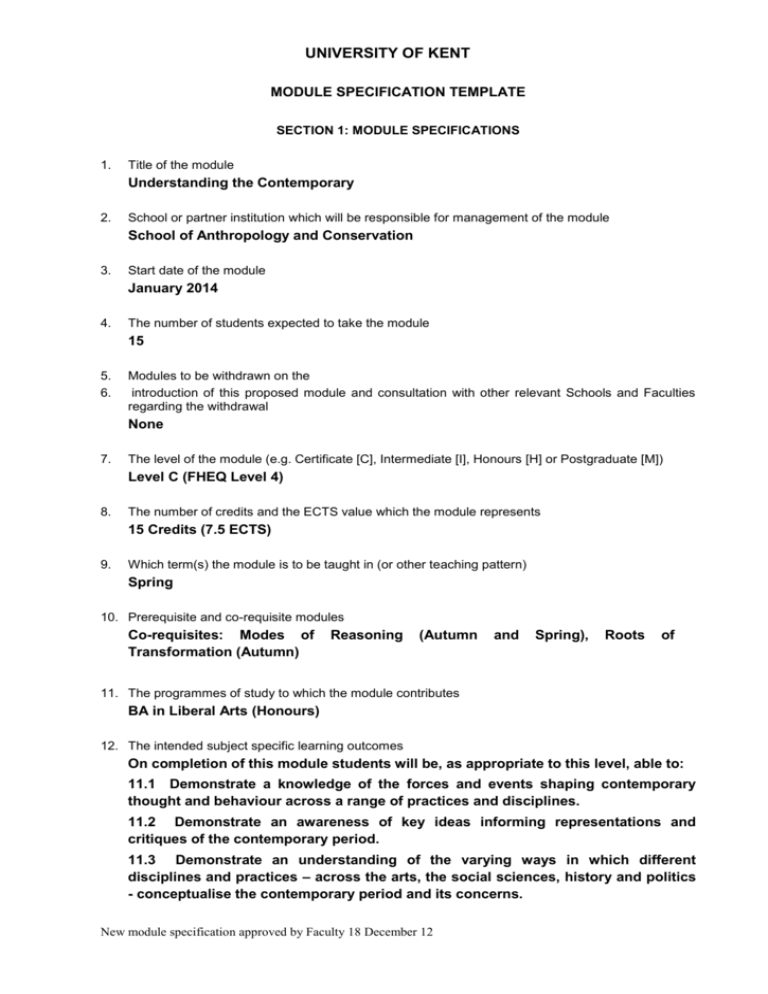
UNIVERSITY OF KENT MODULE SPECIFICATION TEMPLATE SECTION 1: MODULE SPECIFICATIONS 1. Title of the module Understanding the Contemporary 2. School or partner institution which will be responsible for management of the module School of Anthropology and Conservation 3. Start date of the module January 2014 4. The number of students expected to take the module 15 5. 6. Modules to be withdrawn on the introduction of this proposed module and consultation with other relevant Schools and Faculties regarding the withdrawal None 7. The level of the module (e.g. Certificate [C], Intermediate [I], Honours [H] or Postgraduate [M]) Level C (FHEQ Level 4) 8. The number of credits and the ECTS value which the module represents 15 Credits (7.5 ECTS) 9. Which term(s) the module is to be taught in (or other teaching pattern) Spring 10. Prerequisite and co-requisite modules Co-requisites: Modes of Transformation (Autumn) Reasoning (Autumn and Spring), Roots of 11. The programmes of study to which the module contributes BA in Liberal Arts (Honours) 12. The intended subject specific learning outcomes On completion of this module students will be, as appropriate to this level, able to: 11.1 Demonstrate a knowledge of the forces and events shaping contemporary thought and behaviour across a range of practices and disciplines. 11.2 Demonstrate an awareness of key ideas informing representations and critiques of the contemporary period. 11.3 Demonstrate an understanding of the varying ways in which different disciplines and practices – across the arts, the social sciences, history and politics - conceptualise the contemporary period and its concerns. New module specification approved by Faculty 18 December 12 UNIVERSITY OF KENT 11.4 Demonstrate a knowledge and understanding of forms of representation that have emerged in the contemporary period. 11.5 Show an ability to relate issues in contemporary politics and society to developments in contemporary arts and culture. 11.6 Demonstrate an ability to formulate and intellectually respond to the problems and challenges shaping contemporary culture and society. 13. The intended generic learning outcomes In completing this module students will demonstrate ability, appropriate to this level, to: 12.1. formulate research questions and hypotheses to address problems shaping contemporary culture and society 12.2. interpret arguments, evidence and data; to marshal information from published sources; to critically evaluate their own research and that of others 12.3. use appropriate technology to retrieve, analyse and present information 12.4. construct arguments within different intellectual contexts and disciplines 12.5. communicate across disciplines, to mediate key ideas between disciplines, to speak and write persuasively in discursive contexts. 12.6. make use of constructive informal feedback from staff and peers and assess own progress to enhance performance and personal skills 12.7. work in a self-motivated and independent fashion, to plan time and workload management in order to meet personal targets and imposed deadlines 14. A synopsis of the curriculum ‘Understanding the Contemporary’ will enable students to think critically about their own period, and analyse the forces and events shaping contemporary culture and society. Students will consider texts from a range of disciplines and will be selectively introduced to key ideas in contemporary theory and philosophy. They will furthermore apply insights drawn from their readings and discussions to practical analysis of contemporary situations, not only through developing awareness of current events but also through designing and carrying out field analysis of social and historical changes in local communities (linked both to the research plan designed in Modes of Reasoning and to SSPSSR’s quantitative teaching methods programme). The focus of the module will be on the period since 2000, though clearly it will be necessary to reach back before that date to contextualise current issues. Students will be required to think critically about the ways different disciplines are formulating representations of the contemporary period, and to discuss themes and ideas that cross disciplines. Week by week, seminars and lectures will address topics that define the present period, for instance, migration, environmental change, financial crisis, democratic agency, and new media. The module will consider how different disciplines and intellectual traditions are responding to and framing such issues and developments so developing skills of comparative and cross-disciplinary reading. It is in the nature of the module that its study topics will vary from year to year. Overall, the module will develop multi-disciplinary understandings of the contemporary world and will encourage students to consider their role in shaping it. 15. Indicative Reading List New module specification approved by Faculty 18 December 12 UNIVERSITY OF KENT There is no set text for this module. It will feature a topic driven approach, with sample texts and extracts being introduced to address the given issue from a range of disciplines. This is an intentional strategy to place students at the heart of the creation of knowledge. As such, original essays, journal articles and extracts from books will be selected from existing library provision and will provide the focus for bi-weekly discussions. The following list is indicative of the kind of reading students will be introduced to: Giorgio Agamben, ‘What is the Contemporary’, in What Is An Apparatus (Stanford University Press, 2009) Michael Agar, The Professional Stranger: an Informal Introduction to Ethnography (Academic Press 1996) Alain Badiou, The Meaning of Sarkozy (Verso, 2010) Tim Clark, Farewell to an Idea: Episodes from a History of Modernism (Yale 2001) Don DeLillo, Cosmopolis (Picador, 2011) David Harvey, Rebel Cities: From the Right to the City to the Urban Revolution (Verso, 2011) Arundhati Roy, Field Notes on Democracy: Listening to Grasshoppers (Haymarket Books, 2009) Hulme, Mike, Why we disagree about Climate change (Cambridge, 2009) 16. Learning and Teaching Methods, including the nature and number of contact hours and the total study hours which will be expected of students, and how these relate to achievement of the intended learning outcomes Teaching will take the form of a 1 hour lecture and 2 1 hour seminars per week. Lectures will introduce students to key texts, ideas and issues and will total 10 hours contact time across the module. Seminars will provide the opportunity for discussion of texts, ideas and issues introduced in lectures and will total 20 hours contact time across the module. Private study will enable students to reflect independently on texts and ideas introduced on the module and will total 120 hours. The total study hours for the module will be 150 hours. Lectures will address learning outcomes 11.1, 11.2, 11.3, 11.4, 11.5, 11.6, 12.1, 12.2, 12.4, 12.5. Seminars will address learning outcomes 11.1, 11.2, 11.3, 11.4, 11.5, 11.6, 12.1, 12.2, 12.4, 12.5. 12.6. Private study will address learning outcomes 11.1, 11.2, 11.3, 11.4, 11.5, 11.6, 12.1, 12.2, 12.3 12.4, 12.5. 12.6. 12.7. 17. Assessment methods and how these relate to testing achievement of the intended learning outcomes. The core aim of the Liberal Arts programme is to facilitate students' abilities to gather, evaluate and integrate an interdisciplinary range of approaches and perspectives into well structured, coherently reasoned and creatively thought out arguments motivated by their own engagement in the programme's investigations. The 100% coursework assessment will promote this creativity while inducing students to develop their writing and analytic skills. Assessment will be 100% coursework: 10% seminar performance mark (to reflect the quality of the student's participation in and contribution to the seminar series as a whole, one element of which will be an oral presentation); 20% for 1000 word report on demographic and field analysis project; 10% for 500 word essay plan; and New module specification approved by Faculty 18 December 12 UNIVERSITY OF KENT 60% for 2000 word essay on a topic chosen by individual students in consultation with module convenors. The purpose of allocating marks to an essay plan is to enable students to develop skills of academic planning and argumentative organisation. Seminar performance and oral presentation will address learning outcomes 11.1, 11.2, 11.3, 11.4, 11.5, 11.6, 12.1, 12.2, 12.3 12.4, 12.5. 12.6. 12.7. Report will address learning outcomes 12.1, 12.2, 12.3, 12.7 Essay plan will address, in particular, outcomes 12.1, 12.2, 12.3, 12.4, 12.6, 12.7. Report will address 12.1, 12.2, 12.3 and 12.7 Essay will address learning outcomes 11.1, 11.2, 11.3, 11.4, 11.5, 11.6, 12.1, 12.2, 12.3 12.4, 12.5. 12.6. 12.7. 18. Implications for learning resources, including staff, library, IT and space Teaching will be resourced from the free standing budget of the Liberal Arts programme (see budget submitted to the Executive Group) engaging team taught pedagogy drawing on Schools across the university and allowing considerable flexibility in staffing from year to year. The programme convenor is currently negotiating teaching arrangements with lecturers (and their Heads of School) interested either in teaching on core modules or offering options to Liberal Arts students. Library and school resources, both textual and electronic, will be regularly reviewed and course handouts revised on an annual basis. Existing Library and IT resources are for the most part adequate for this module, but it is foreseen that the Library may be requested to order multiple copies of some texts (although students will be strongly encouraged to purchase core texts). Where copyright permits, textual material will be placed on Moodle. 19. The School recognises and has embedded the expectations of current disability equality legislation, and supports students with a declared disability or special educational need in its teaching. Within this module we will make reasonable adjustments wherever necessary, including additional or substitute materials, teaching modes or assessment methods for students who have declared and discussed their learning support needs. Arrangements for students with declared disabilities will be made on an individual basis, in consultation with the University’s disability/dyslexia support service, and specialist support will be provided where needed. New module specification approved by Faculty 18 December 12 UNIVERSITY OF KENT SECTION 2: MODULE IS PART OF A PROGRAMME OF STUDY IN A UNIVERSITY SCHOOL Statement by the School Director of Learning and Teaching/School Director of Graduate Studies (as appropriate): "I confirm I have been consulted on the above module proposal and have given advice on the correct procedures and required content of module proposals" 6 December 2012 Director of Learning and Teaching Rajindra K. Puri Statement by the Head of School: "I confirm that the School has approved the introduction of the module and, where the module is proposed by School staff, will be responsible for its resourcing" 6 December 2012 Head of School Glenn Bowman SECTION 3: MODULE IS PART OF A PROGRAMME IN A PARTNER COLLEGE OR VALIDATED INSTITUTION (Where the module is proposed by a Partner College/Validated Institution) Statement by the Nominated Officer of the College/Validated Institution (delete as applicable): "I confirm that the College/Validated Institution (delete as applicable) has approved the introduction of the module and will be responsible for its resourcing" ................................................................. .............................................. Nominated Responsible Officer of Partner College/Validated Institution Date …………………………………………………. Print Name ………………………………………………….. Post Module Specification Template Last updated October 2012 New module specification approved by Faculty 18 December 12
